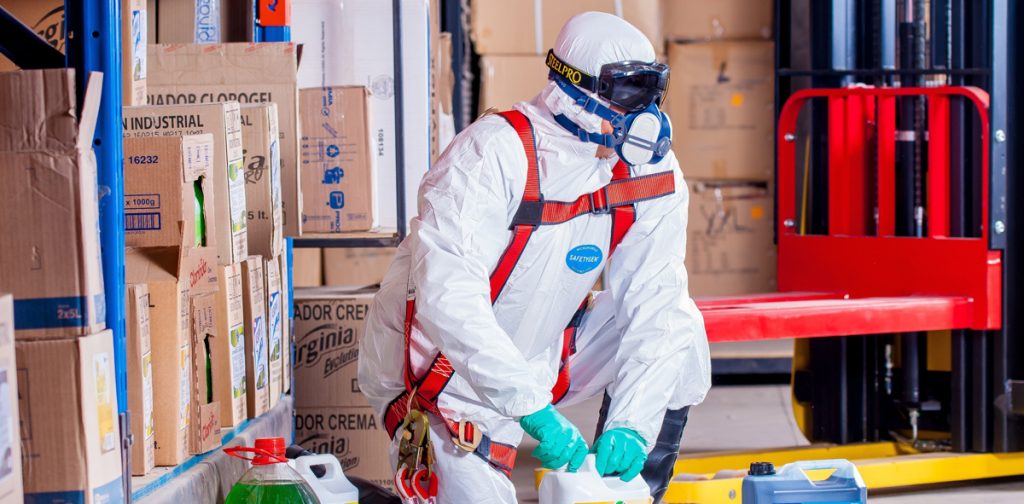At Nocti Business Solutions (NBS), we always place a heavy emphasis on safety. As a provider of pre-employment tests and skill assessments, we feel it is our responsibility to help workers and companies maintain or improve their safety. We also believe that through the provision of information, we lessen the likelihood of accidents and injuries. Process Safety Management is an essential element of worker, company, and even environmental safety, making it an important piece of information for all trade workers.
What is Process Safety Management (PSM)
The official OSHA definition: “(PSM) refers to a set of interrelated approaches to managing hazards associated with the process industries and is intended to reduce the frequency and severity of incidents resulting from releases of chemicals and other energy sources (US OSHA 1993)”
PSM Breakdown
- If a company controls, stores, or manages any chemical or material that is listed by OSHA as hazardous, the company must instill a PSM plan.
- The primary focus of any PSM plan is to reduce the probability, frequency, and severity of the release of hazardous chemicals.
- The PSM plan cannot live on its own and must be integrated with every other processing and management procedure for the company.
Fourteen Elements of PSM
There are fourteen essential elements to PSM, each requiring their own detailed explanation. Below we’ve identified each element as well as provided a brief explanation for each. If you need more information on any element, please refer to OSHA’s guide to Process Safety Management.
Process Safety Information
Written documentation that generally identifies the chemicals, hazards, equipment, technology, and procedures for the company.
Process Hazard Analysis
A thorough evaluation of the process and procedures that involve all hazardous chemicals, identifying all of the potential hazards possible through the process or procedures.
Operating Procedure
Written and documented procedures for anything involving hazardous chemicals that ensure the safety and security of everyone involved as well as the chemicals.
Employee Participation
When creating a PSM plan, employees must be a part of the process, providing hands-on input and feedback.
Training
Companies who implement a PSM plan must provide initial and continuous training for any employees involved in any procedure involving hazardous chemicals. Additionally, companies must keep up-to-date documentation of all.
Contractors
Any contractor, internal or external, working on a facility or equipment involving PSM must also take special precaution. This includes contractors and their employees when performing maintenance or repair, turnaround, major renovation, or specialty work.
Pre-start Up Safety Review
Employers and supervisors must ensure that equipment is 100% ready to perform, prior to the introduction of hazardous materials. Safety reviews must take place for new facilities or after significant repairs.
Mechanical Integrity
Any equipment involved in any PSM process must be tested to prove its mechanical integrity. Tests and results must be recorded and documented.
Hot Work Permit
A document that certifies that OSHA fire prevention and protection requirements have been put in place, reviewed, and approved.
Management of Change
Whenever a change occurs to any process involving PSM, the change must be reviewed and evaluated to ensure the safety and security of the employees, facility, and the surrounding environment.
Incident Investigation
If and when an incident occurs, a thorough investigation is a must. Employers must identify what caused the incident and what changes are going to be taken to avoid the same incident. All of this must be recorded and documented.
Emergency Planning & Response
If an emergency ever does take place, there must be an emergency plan in place that ALL employees are trained on and ready to execute. Plans not only ensure the safety of all employees but limit the release of harmful chemicals or materials into the surrounding community and environment.
Compliance Audit
Employers must certify their PSM process at least every three years to ensure their compliance with PSM standards and regulations.
Trade Secrets
There are no secrets when it comes to PSM compliance. Employers must make all information available to employees, to ensure that everyone is prepared and understands the severity of every procedure.
Why Should All Employees Be Familiar with PSM Procedures?
It’s no surprise that manufacturing and processing companies may require potentially dangerous material or chemicals. When using these chemicals and an accident happens, there are real consequences that affect much more than today’s production. Serious employee injuries, environmental pollution, and crippling facility damage all can be a consequence of not following Process System Management.
There are millions of US workers who are surrounded by potentially dangerous materials every day. Even though the percentage of injuries and deaths have dramatically declined over the past few decades, accidents are still a common occurrence. Furthermore, unsolved chronic diseases are thought to be the result of long-term exposure to hazardous chemicals where proper precautions were not taken. Not to mention countless spills of chemicals and oils that seep into the Earth each year. In fact, a New York Times report found that more than 18.4 million gallons of oils and chemicals spilled, leaked, or misted into the United States’ air, land, and waterways between 2006 and 2014, the long-term results of which are yet unknown.
PSM is the solution
Process Safety Management is designed to help ensure worker safety and lessen harmful spills of chemicals throughout the US. It is imperative that employees directly involved with a PSM process and even employees who are relatively close to the process are well aware of all PSM compliance and procedures. By ensuring that, employers take the necessary steps to lessen the probability that a serious accident will take place. More importantly, they protect their company’s most precious asset—their employees.
The NBS Difference
If you want to ensure that all of your employees are familiar with your PSM plans and procedures, consider creating an NBS custom assessment. Our tests are designed to be fair and accurate, identifying all knowledge levels of your PSM program. If you’re curious about our custom testing capabilities, contact us today—we are happy to help!

Recent Comments